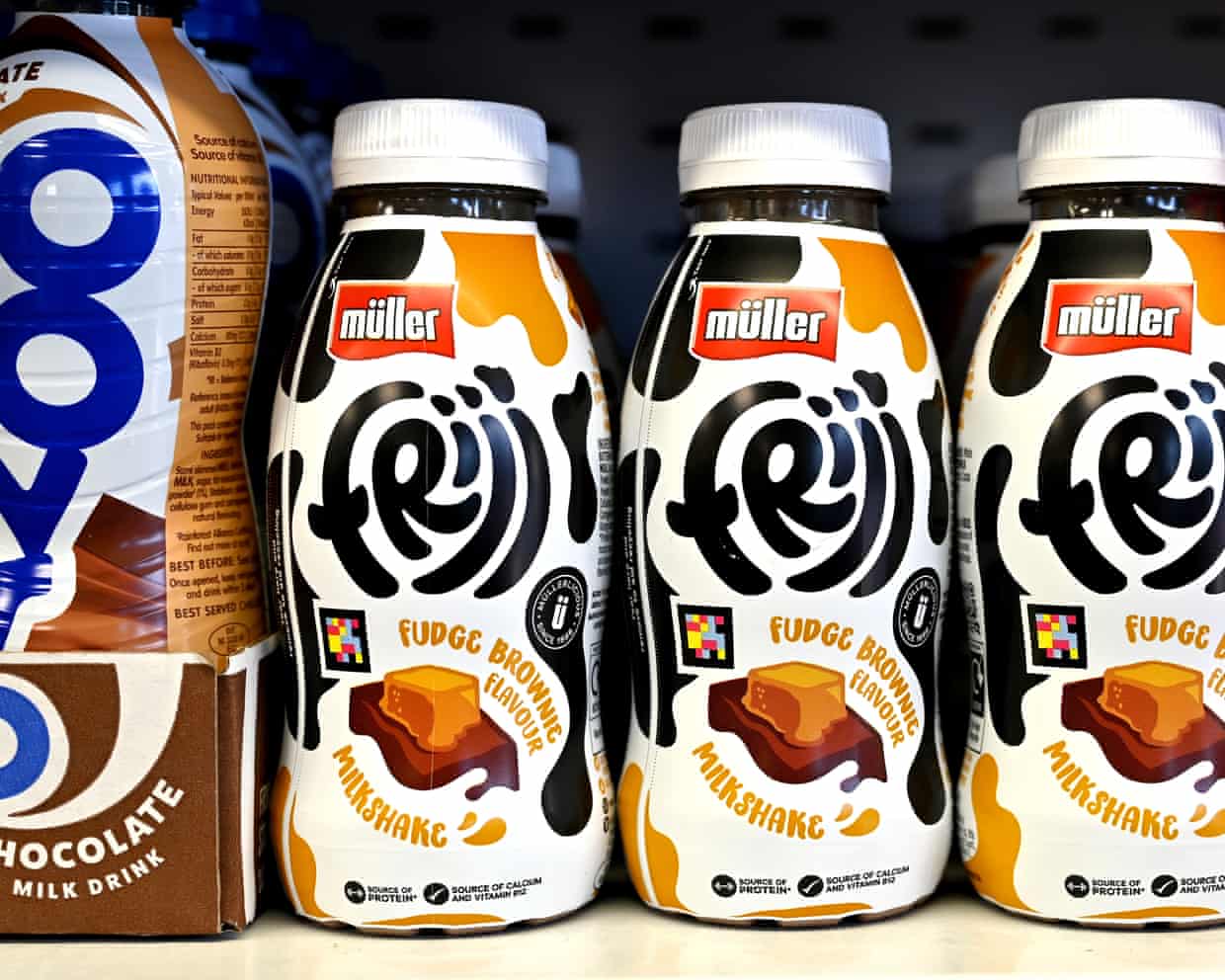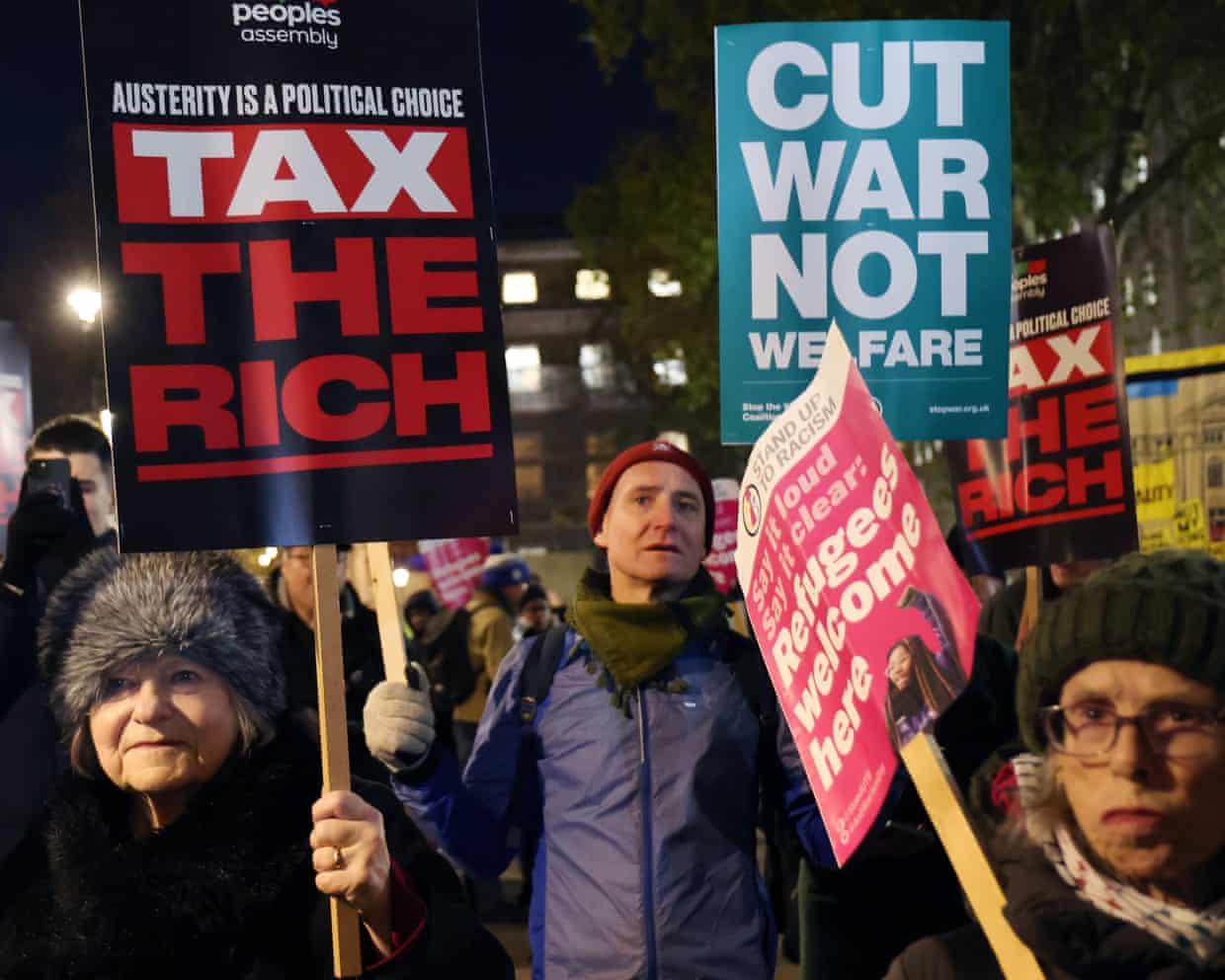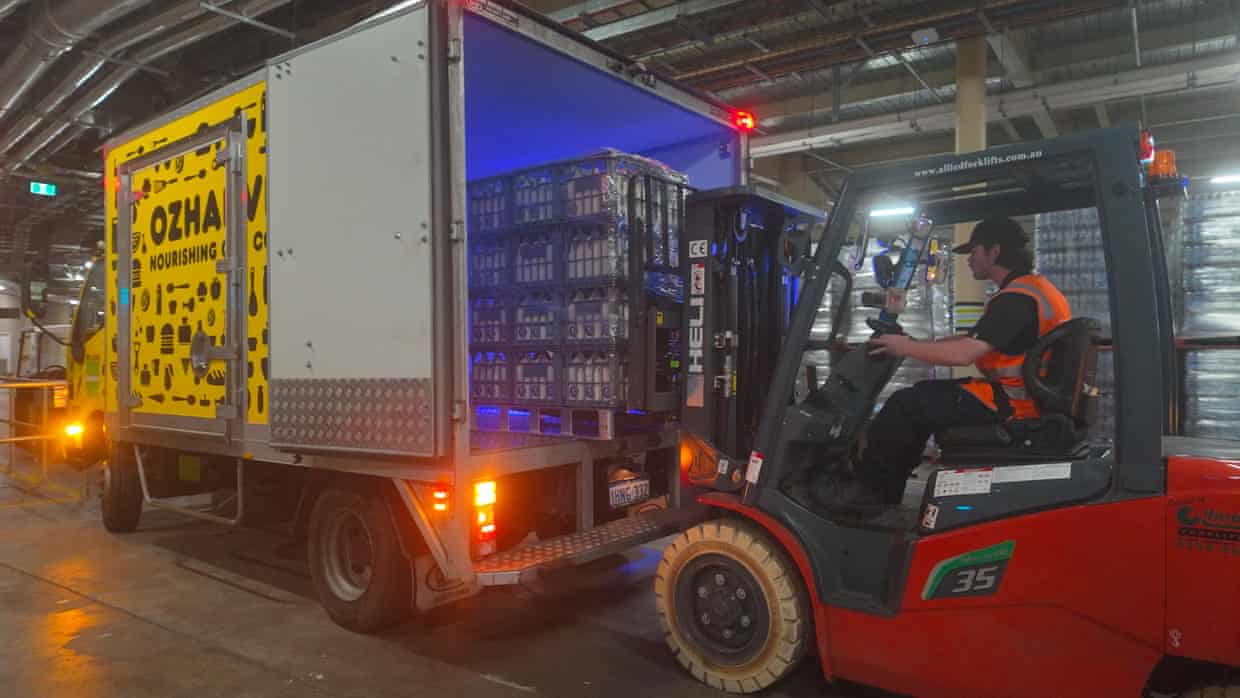UK sugar tax to be extended to more soft drinks and milkshakes; markets rally ahead of the budget – as it happened

Britain will end the exemption for pre-packaged milkshakes and milky coffees from an existing tax on sugary drinks from January 2028, the health department has announced.The sugar tax, also known as the soft drink industry levy (SDIL), is a tax on pre-packaged drinks such as those sold in cans and cartons in supermarkets.It was introduced by the Conservative government in 2016 to help drive down obesity, particularly among children.The Health Department has announced that:the government will reduce the current lower threshold at which SDIL applies from 5g of total sugars per 100ml to 4.5g of total sugars per 100mlthe government will remove the current exemption for milk-based drinks with added sugar.
A ‘lactose allowance’ will be introduced to account for naturally occurring sugars in milkthe government will remove the exemption for milk substitute drinks with added sugar.Milk substitute drinks without added sugar will remain outside the scope of SDIL.This includes plant-based drinks that only contain sugars derived from their principal or ‘core’ ingredientAnd finally, the City of London is ending Budget Day Eve in good heart.The stock markets have closed higher tonight, with the FTSE 100 share index ending the day 75 points higher, or +0.78%, at 9,609 points.
Banks were among the risers, following reports that they will avoid a windfall tax in tomorrow’s budget,Kingfisher jumped 6% after the DIY chain lifted its profit guidance this morning,UK bonds have rallied today too, pushing down the yields (or interest rates) on British government debt,10-year bond yields have dropped by 5 basis points (0,05 percentage points) to 4.
495%, while 30-year yields are down 4bps at 5.32%.Reminder, our story about the sugar tax is here:Chartered accountancy group ICAEW are concerned that extending the soft drinks industry levy (SDIL) to packaged milk-based drinks will introduces unnecessary complexity and only yield limited public health gain.ICAEW argues that lowering the sugar threshold from 5g to 4.5g targets just 11% of the market – many drinks affected will only need to remove a small amount of sugar to remain exemptEd Saltmarsh, ICAEW technical manager, VAT and Customs, said:“The success of the original soft drinks industry levy was built on its simplicity and the clear incentive it created for reformulation.
Introducing complex allowances for milk-based drinks risks undermining that simplicity.“Furthermore, we are concerned that shifting the goalposts to 4.5g chases diminishing returns and penalises the very businesses that previously reformulated, while leaving the highest-sugar drinks on the market untouched.“It also creates a confused tax landscape.If the government believes the health harms of sugar outweigh the nutritional benefits of milk, it raises questions about why other high-sugar categories, such as pure fruit juices and smoothies, remain entirely exempt despite often containing more sugar than the drinks being targeted by the threshold change.
”Mark Jones, partner and food & drink expert at law firm Gordons, highlights the long-term benefits (and potential downside) from the sugar tax:“The changes to the Soft Drinks Industry Levy, more commonly known as the ‘sugar tax’, come at a time 28 per cent of all children are overweight and 41 per cent of 10–11-year-olds are overweight, which doesn’t bode well for the future and the potential costs that will fall on the NHS from diet related diseases.Milk based drinks are currently exempt from the levy, which is odd given they are more likely to be consumed by children.“Expert reviews identify stronger measures on sugar as one of the most effective levers for improving diets nationwide and reducing calorie intake.The National Food Strategy by Henry Dimbleby was clear that an expanded sugar tax should form part of a holistic approach to reducing diet-related illness.“Recommendations from the innovation agency Nesta also reinforce that expanded taxation to encourage manufacturers to cut sugar is essential for long-term improvements in public health.
“With a full food strategy due in 2026, it is important that the government’s final plans keep evidence-based sugar-reduction measures at their core, and the proposed amendment to the levy does that.“The downside to these types of policies is that you are picking your poison.The sugar tax led to lots of re-formulation to avoid the tax with artificial sweeteners being used as a substitute.We don’t know if artificial flavour enhancers/sweeteners have any downsides yet but given the, yet unproven, concerns around UPF, we may be trading one bad thing for another.”Just in: the British government has announced it will hand new powers to local mayors in England to introduce a tourist tax.
England’s mayors will be able to impose a new levy on overnight stays, to raise money to invest in transport, infrastructure, and the visitor economy, the government says,The government says the move would ensure UK mayors have the same powers as their counterparts in cities like New York, Paris and Milan to bring in charges on short-term visitors staying at hotels, holiday lets, bed and breakfasts, and guesthouses,Secretary of State for Housing, Communities and Local Government Steve Reed said:Tourists travel from near and far to visit England’s brilliant cities and regions,We’re giving our mayors powers to harness this and put more money into local priorities, so they can keep driving growth and investing in these communities for years to come,Rachel Reeves is expected to announce a stamp duty holiday for companies listing on the London stock exchange, in an effort to revive the City.
Bloomberg report that the exemption will mean investors won’t have to pay the tax when they buy shares in companies in the first three years after they list on the London Stock Exchange.Currently, stamp duty of 0.5% is levied on share purchases.The change could redress some businesses’ concerns about demand for UK shares, reckons Emma Wall, chief investment strategist at Hargreaves Lansdown:“The Chancellor is expected to announce a welcome boost for the UK stock market in tomorrow’s Budget – a stamp duty holiday for new listings on the London Stock Exchange.London has been losing out to New York in recent years, as businesses favour the funding and regulatory environment of the NYSE.
But if this Budget rumour proves accurate, it may be the carrot British businesses need to plump for a domestic listing.Currently investors have to pay 0.5% stamp duty tax when they buy shares, but this is expected to be waived for new listings for up to three years – though this has not yet been confirmed.This would make buying British more enticing for investors and help redress some businesses’ concerns about demand for UK shares.If this goes ahead, it would help strengthen the Government’s stated position that they are both pro-business and supportive of a growing retail investment culture in the UK.
”There are also concerns that the new sugar levy will add to the burden on the UK’s retail and food & drink sector.Nick Garside, VAT partner at business advisory firm Menzies, said:“The milkshake tax is another blow to businesses already drowning in complex taxes and soaring fixed costs.“If this isn’t balanced with meaningful business rates reform for hospitality, leisure, and retail, it’s a clear net negative for growth.“While the levy targets only packaged drinks, not fresh cafe-made shakes, it still shakes up a struggling sector, and piles on administrative burden and cost at a time when margins are already diluted and consumer demand dwindles.”Health charities are welcoming the extension of the sugar tax.
Helen Kirrane, head of policy, campaigns & mobilisation at Diabetes UK said:“With cases of type 2 diabetes continuing to rise at an alarming rate, particularly in younger people, we need bold action to cut unnecessary sugar from food and drink.“The Soft Drinks Industry Levy has already substantially reduced the sugar in soft drinks, lowering the amount of sugar consumed by children.Expanding it to include milk-based and milk-alternative drinks, which can contain large amounts of hidden sugar, is a welcome step forward.“We know that, for many people, it can be overwhelming to navigate such a wide range of products, and it’s not always clear what is good for us.This change will help ensure the healthier choice is the easier choice.
”Dr Charmaine Griffiths, chief executive of the British Heart Foundation (BHF), said:“The more sugar cut from drinks on supermarket shelves, the better, so extending the levy to include sugary milk-based drinks is the right thing to do.The current levy has been extremely effective at incentivising manufacturers to reduce sugar levels in soft drinks, and evidence has shown free sugar consumption in children and adults has decreased.“Diets high in sugar are linked to weight gain and obesity, which increase the risk cardiovascular disease, high blood pressure and type 2 diabetes.We hope this move motivates manufacturers to cut the amount of sugar in milk-based drinks and going forward, we need to keep up the pace of progress so families have far more healthy choices available to them.”Dr Ian Walker, executive director of policy at Cancer Research UK, said:“We welcome the UK Government taking stronger action on sugary drinks by extending the Soft Drinks Industry Levy to milk-based products and lowering the sugar threshold.
These steps will help cut sugar consumption, support healthier choices, and ultimately reduce the risk of cancer – something Cancer Research UK has long called for,“Bold measures like this, alongside commitments on junk food advertising and healthy food standards, must now be delivered in full and enforced properly to create healthier environments for everyone,”Reformulating drinks to cut down the amount of sugar will add to producers’ costs, points out Pinsent Masons partner Zoe Betts:“The government aims, with initiatives such as the sugar tax to help people make healthier choices, are to be applauded,However, industry cannot bear this burden alone,Addressing the obesity epidemic requires cross stakeholder collaboration, bringing in not just industry but health and education to ensure people are properly and fully equipped to make better choices.
Reformulation results in significant cost to a business and can affect all in their supply chain, at a time they can least afford this.Whilst it may well result in a product with less sugar content, that does not always equate with being healthier.Care will be required to ensure that the resultant reformulation does not itself create a problem, simply fuelling obesity by another means.”Dr Charlotte Eckhardt, dean of the Faculty of Dental Surgery (FDS) at the Royal College of Surgeons of England, has welcomed the widening of the sugar tax – saying it will improve oral health.“After years of campaigning, we welcome the Government’s decision to extend the Soft Drinks Industry Levy to include milk-based drinks and lower the threshold from 5g to 4.
5g of sugar per 100ml as a significant victory for public health.“Tooth decay remains the leading cause of hospital admissions among 5- to 9-year-olds in England, outpacing other illnesses such as acute tonsilitis.Extending the Levy represents a major step towards protecting children’s oral health.“FDS has consistently called for the threshold to be lowered to 4g of sugar per 100ml.While today’s announcement does not go as far as we recommend, we nevertheless welcome this change and remain hopeful that it will improve the dental and public health of the nation.
”Here’s our news story on the sugar tax shake-up:The changes to the sugar tax will kick in later than expected.The government had proposed implementing changes from 1 April 2027, in its consultation about the plan.Today, though, it says they will begin from 1 January 2028.This date was pushed back after the drinks industry pointed out it will face “reformulation challenges” to bring down sugar levels, and will also be busy implementing the UK’s new Deposit Return Scheme.Widening the scope of the sugar tax should go a little way towards closing Rachel Reeves’s fiscal black hole.
The levy will raise up to £100m a year from 2027, according to The Times.Milk substitute drinks which contain added sugar are also being dragged into the Soft Drinks Industry Levy (the sugar tax).The health department says the government will remove the exemption for milk substitute drinks with added sugar.This will bring plant-based drinks with added sugar into scope of the Levy, if they contain 4.5g or more total sugars per 100ml.
However, plant-based drinks which contain only sugars released from their principal, or ‘core,’ ingredient – such as soya, or oats - will be out of scope, the same as plain animal milks,

Rachel Reeves looks to reassure bond markets with tax-heavy budget – business live
Good morning, and welcome to our rolling coverage of business, the financial markets and the world economy.“You can please some of the people all of the time, you can please all of the people some of the time, but you can’t please all of the people all of the time,” as the old quote has it.And today, chancellor Rachel Reeves faces the challenging task of pleasing (or at least not displeasing too badly) four different constituencies – Labour MPs, voters, businesses, and the bond market – with her budget announcement, which is likely to be heavy on taxes.Reeves faces a tough task, given the £9.9bn headroom to keep within her fiscal rules has been eroded by higher borrowing costs, and welfare U-turns

Reserve Bank could raise interest rates as early as May after inflation climbs to 3.8%
The Reserve Bank of Australia could be forced to hike interest rates as early as May, economists say, after inflation climbed to 3.8% in the year to October, from 3.6% in the month before.The latest bad news on cost of living was accompanied by a shocking 37% annual jump in power bills as generous state government subsidies rolled off, figures from the Australian Bureau of Statistics revealed.As the Coalition again used parliamentary question time to attack the government for its record on electricity prices, Jim Chalmers flagged he could announce further energy bill relief for households in the upcoming midyear budget

Europe loosens reins on AI – and US takes them off
Hello, and welcome to TechScape. I’m your host, Blake Montgomery, writing to you from an American grocery store, where I’m planning my Thanksgiving pies.In tech, the European Union is deregulating artificial intelligence; the United States is going even further. The AI bubble has not popped, thanks to Nvidia’s astronomical quarterly earnings, but fears persist. And Meta has avoided a breakup for a similar reason as Google

Macquarie Dictionary announces ‘AI slop’ as its word of the year, beating out Ozempic face
AI slop is here, it’s ubiquitous, it’s being used by the US president, Donald Trump, and now, it’s the word of the year.The Macquarie Dictionary dubbed the term the epitome of 2025 linguistics, with a committee of word experts saying the outcome embodies the word of the year’s general theme of reflecting “a major aspect of society or societal change throughout the year”.“We understand now in 2025 what we mean by slop – AI generated slop, which lacks meaningful content or use,” the committee said in a statement announcing its decision.“While in recent years we’ve learnt to become search engineers to find meaningful information, we now need to become prompt engineers in order to wade through the AI slop. Slop in this sense will be a robust addition to English for years to come

Roman amphitheatre older than Colosseum gets accessible facelift for Winter Paralympics
A 2,000-year-old Roman amphitheatre is to be made fully accessible to people with disabilities before the Winter Paralympic Games in Milano‑Cortina, as organisers prioritise legacy with 100 days to go.The conversion of the Arena di Verona, which will host the Paralympics opening ceremony, includes the addition of a lift and toilets to a structure older than the Colosseum. Described by the Milano-Cortina 2026 chief executive, Andrea Varnier, as “the symbol of our Paralympic Games”, he admits the conversion has also been considered as an act of “blasphemy” by some traditionalists.“The decision to stage the opening ceremony in the Arena di Verona is not just an aesthetic one although, of course, we like to showcase such a beauty,” Varnier said. “But it was also an idea, to make the arena accessible and not only the arena itself but the entire route from the railway station to the venue

Short first Ashes Test results in record donation of surplus food across Western Australia
The shortened Ashes Test in Perth might have left administrators scrambling to recover a multimillion-dollar shortfall, broadcasters scrambling to fill three days of airtime and fans wondering what to do with newfound time on their hands, but for others, England’s early capitulation in the series opener was a blessing.A huge surplus of food, which was intended for another bumper crowd with a third day of cricket anticipated but never used as the game wrapped up inside two days, has been donated to charitable causes across Western Australia.Optus Stadium, known as Perth Stadium for the duration of the first Test, directed all surplus food to OZHarvest, Australia’s leading food rescue service, which in turn partnered with SecondBite and Foodbank WA to distribute the food to those in need across the state.The organisation said it was the biggest single donation it had ever received in Western Australia.WA’s deputy premier, Rita Saffioti, lauded the move, saying it demonstrated “community spirit at its best”

Chef Skye Gyngell, who pioneered the slow food movement, dies aged 62

How to make the perfect butter paneer – recipe | Felicity Cloake's How to make the perfect …

Fluffy and fabulous! 17 ways with marshmallows – from cheesecake to salad to an espresso martini

The Shaston Arms, London W1: ‘Just because you can do things doesn’t mean you should do them’ – restaurant review | Grace Dent on restaurants

Goblets of borscht, turkey-shaped madeleines: why Martha Stewart’s fantastical menus are still an inspiration

Winter has finally kicked in – it’s time to crack out the casserole dish and get stewing